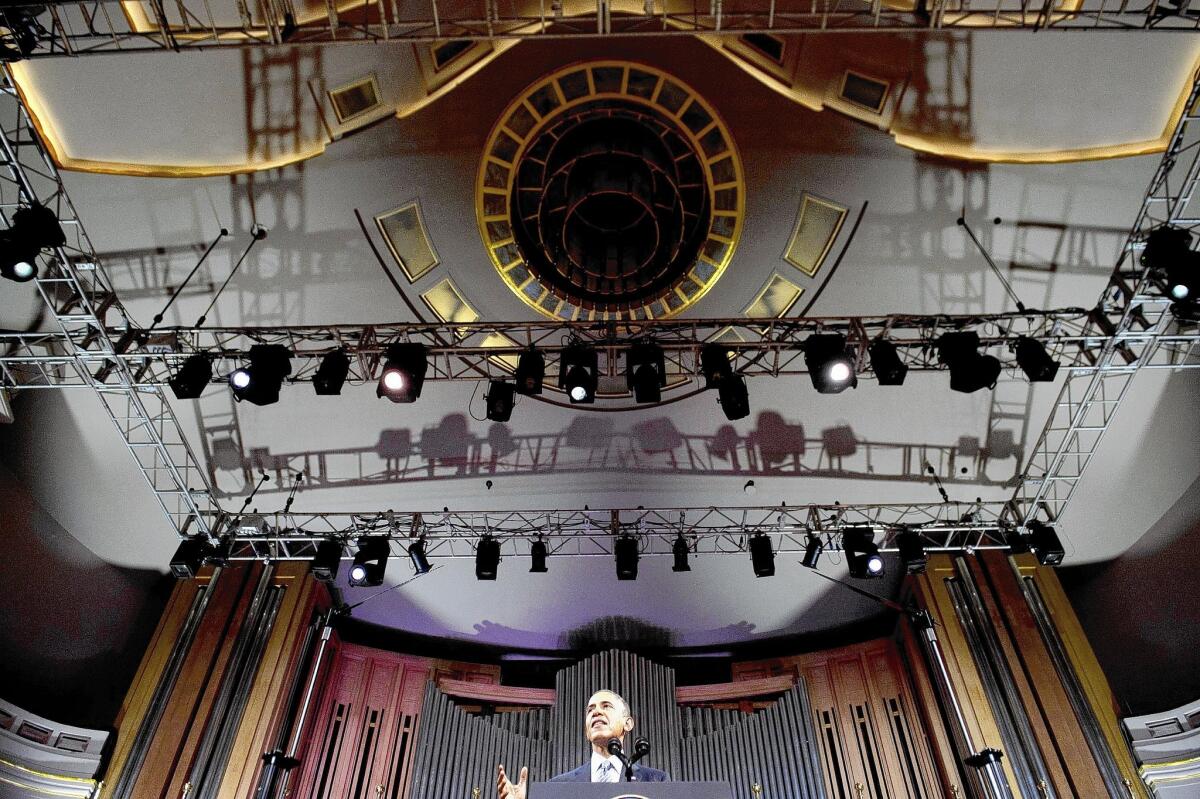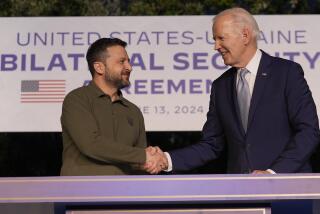Ukraine is big deal, but not the biggest deal for the U.S.

WASHINGTON — In speeches and remarks last week in Europe, President Obama made it clear that he considers Russia’s annexation of Crimea a very big deal. But he also defined what it’s not: an overwhelming national security threat, such as the U.S.-Soviet rivalry in the Cold War, that would trump all other foreign policy priorities.
In appearances before European Union leaders, Obama called for a sustained effort to isolate Russia to discourage further encroachment on its neighbors, but emphasized that Russia is not the West’s top geopolitical challenge.
The president’s approach to the Ukraine crisis has sparked a debate among foreign policy experts, including current and former advisors, on how aggressively to counter Russia’s resurgent ambitions.
One group, which includes Obama’s former ambassador to Russia, Michael McFaul, and his former Defense secretary, Robert M. Gates, urges a more confrontational approach. McFaul calls for the U.S. to end a “drift of disengagement” from world affairs and to “lead the free world in a new struggle.” Gates wants to roll back last year’s defense cuts.
At the other end of the spectrum is Anne-Marie Slaughter, the State Department’s planning chief in Obama’s first term. She warns that an overreaction could serve “military and defense interests too well” and that, in sharpening East-West tension, become a self-fulfilling prophecy.
Obama, in his visit to Europe last week, showed that he’s straddling the middle, at least for now.
Russia, he said, is a declining “regional power” whose armed seizure of Crimea exposes its weakness, as it has lost influence in Ukraine and other former Soviet states.
He called for a modest increase in U.S. military rotations into Eastern Europe but no interruption in his administration’s plans to shrink defense spending.
Obama threatened to aim sanctions at whole sectors of the Russian economy, such as energy, banking or arms sales, a step that could inflict grave damage. But that would happen only if Russia seized territory in eastern Ukraine or took other steps to escalate the situation, he said.
The Ukraine crisis “worries them — it’s keeping them awake at night,” said Julianne Smith, a White House foreign policy advisor in Obama’s first term. “But this is not going to be an all-consuming foreign policy priority.”
Though Ukraine is on the “top 10 list” of priorities, along with Iran’s nuclear program and China’s territorial disputes with its neighbors, “there’s a scale here,” she said. “Compared to some other things on the list, this still isn’t as threatening to core U.S. security interests.”
Asked whether the Russian move would force an end to the administration’s long-desired foreign policy “pivot to Asia,” deputy national security advisor Ben Rhodes pointed out that Obama has scheduled two trips to East Asia this year and promised that they would not be canceled because of turmoil in Europe.
“We’ve got a significant agenda in Asia that we’re going to continue to pursue that’s not going to be impacted by what we’re doing in Europe,” Rhodes said.
Nevertheless, aware that his presidency will be judged on his handling of this crisis, Obama has sought to show that he intends to continue America’s role as the leader of the U.S.-European security alliance. He continues to play the leading role in seeking a resolution, talking Friday with Russian President Vladimir Putin, who agreed that their top diplomats should meet. Secretary of State John F. Kerry and Russian Foreign Minister Sergei Lavrov plan a session Sunday evening in Paris.
Yet he also gave heavy emphasis to how much of the onus is on Europe — to spend more to support the NATO alliance, to impose economic sanctions on Russia, and to play a central role in guiding and paying for the rebuilding of the bankrupt government of Ukraine.
“If we’ve got collective defense, everybody’s got to chip in,” Obama Wednesday said in Brussels.
Smith predicted that much of the new U.S. effort on Russia would be aimed at getting Europe to do more to combat the threat from Russia, rather than adding on to what the United States has already been doing.
But many experts in Washington are now calling for the administration to rethink its planned 2015 defense budget cuts of $500 billion in view of the possible need to strengthen U.S. forces in Europe, which have shrunk 85% since the Cold War’s end in 1989.
Gates, Obama’s former secretary of Defense, is urging the administration to restore the budget to the 2014 level. And R. Nicholas Burns, a former top diplomat in both Democratic and Republican administrations, citing in particular the dwindling U.S. Army presence in Europe, said, “We should completely redraw that budget.”
But Obama’s defense officials, under heavy pressure to reduce spending, say they won’t rethink the numbers unless the situation in Ukraine becomes far more dire.
The growing threat in Europe didn’t figure into the military strategy laid out in the recently released Pentagon planning blueprint called the Quadrennial Defense Review, nor is it likely to change the outlines of an upcoming White House policy statement, the National Security Strategy, said Smith, who is now with the Center for a New American Security.
Obama said last week that the U.S. would not recognize Russia’s annexation of Crimea. But administration officials acknowledge privately that they’re not going to try to take it back, either.
U.S. officials also aren’t talking about permanently stationing NATO troops near the Russian border, which has been considered a “red line” since the end of the Cold War.
Indeed, U.S. officials see their maneuvering room as limited.
For now, they have ruled out providing arms to the Ukrainian army, in part because of concern that the Russians could see it as a provocation and escalate their military involvement.
In their use of sanctions, U.S. officials are limited by their dependence on European governments to follow suit, but the Europeans are more economically intertwined with Moscow and more reluctant to hit it with economic penalties.
Officials say they may go further than Europe would with sanctions. But because of the limited U.S. trade and investment with Russia, “you’ve got to ask yourself, would Russia care?” Smith asked.
Obama administration officials say they’re rethinking the entire U.S.-Russian relationship and are planning to halt activities — such as joint programs on military cooperation, economics and trade — that the Russians liked. But these were relatively insignificant, and the relationship has been stagnating, so there’s not much to end.
And U.S. officials, who want to continue cooperation with Russia on Iran’s nuclear program, Syria’s chemical weapons disarmament and other issues, say they will remain open to collaboration on other areas, if Moscow is serious.
Still, though U.S. officials have planned a limited role, they acknowledge that they may be forced to quickly expand it if Russia makes more aggressive moves, such as seizing eastern Ukraine, an action that Lavrov said on Saturday reiterated Russia does not intend to undertake.
“That could be a bit of a game changer,” Smith said.
More to Read
Sign up for Essential California
The most important California stories and recommendations in your inbox every morning.
You may occasionally receive promotional content from the Los Angeles Times.











